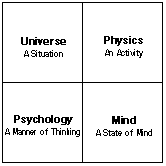When we seek to classify something, we try to narrow its definition, such as when we ask if something is animal, vegetable, or mineral. When classifying problems that might be of concern to the Story Mind, the first thing we might want to know is if the problem is an external issue (such as an intolerable situation) or an internal one (such as a bad attitude). External problems occur in the Universe (or environment), Internal problems occur in the Mind.
Further, some problems don’t have to do with states of things (an external situation or an internal attitude) but are processes that have gone awry. An external process falls in the category of Physics, which simply means physical activity of some kind. An internal process which results in a problem has to do with Psychology, which simply means a manner of thinking. Note that a manner of thinking (Psychology) is different than a fixed attitude (Mind). Psychology describes problems like spending too much time with details, whereas Mind problems would be more like a prejudice.
Having identified four categories by which we might classify the nature of the Story Mind’s problem, we can arrange them in a quad pattern, much as we did earlier with the Character Elements.

Since these four categories classify the problem, Dramatica refers to them as CLASSES.
More Resolution
So far, we have been able to roughly determine that a problem might be an external or internal state or process, represented by the four Classes. Already we can get a more refined view of the problem we will be describing in our story. We need only consider which of these four Classes best describes the problem about which we want to write.
For example, if we have an idea for a story about people trapped underwater in a sunken ship, that would be an external problem, best described as a state of things. An external state is the definition of a Universe problem, so this story idea takes place in the Universe Class.
If we wish to write about a harrowing trek through the jungle to a lost city, we are describing a Physics problem: an external activity from which difficulties arise.
A story exploring a father who will not let his daughter marry below her station in life is best described as a Mind problem, for it stems from a fixed attitude.
And finally, an author who wishes to comment thematically on a group of friends manipulating each other would select Psychology as his Class of problem, for the thematic issue at hand is changing one’s manner of thinking. Again, this differs from changing one’s Mind (about something).
It is important to note that ALL FOUR Classes will ultimately play a role in every complete Grand Argument Story. As we shall explore a bit later, each Class will describe the problem as it appears from a different throughline.
From the Dramatica Theory Book



